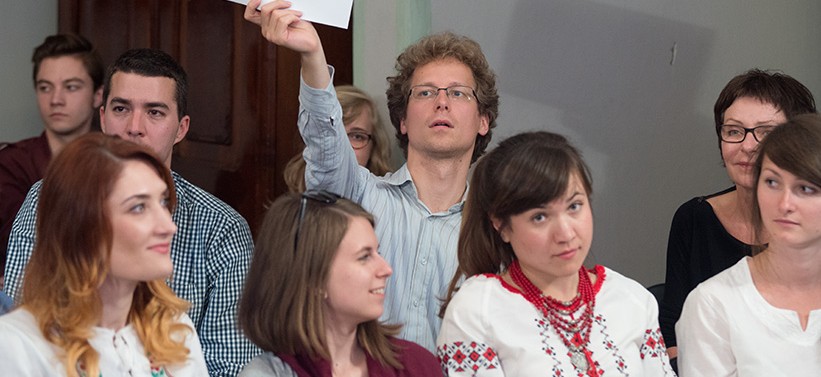
The second term of Visegrad Summer School started with a lecture day about the current state of education and about the challenges of civil society in the Visegrad countries.
Michel Henri Kowalewicz historian of ideas, professor of Jagiellonian University in Krakow opened Monday’s lecture session in Villa Decius with his short presentation titled Idea universitas, or the boundaries of time travel – speaking about higher education from a cultural historical point of view.
We don’t need papers but critical thinkers
After Mr. Kowalewicz’s brief introduction setting the frame of further discussion, Samuel Abrahám took the floor. A scholar from Slovakia and a political philosopher educated in Canada, Mr. Abrahám presides the newly created Bratislava International School of Liberal Education which explains his choice of topic -namely: what tendencies define higher education in Central European countries from 25 year’s perspective, and how liberal arts education can contribute to the improvement of it?
“Education as an industry never talks about the substance that is the undergraduate” – stated Abrahám, reasoning why he intended to address the problems this elementary sphere of higher education first. After conducting a quick survey among the summer school students complementing his own perception, Abrahám draw the conclusion that although “undergraduate studies is the base where students can really find their place in society”, its potential is purely exploited. According to Abrahám a symptom of the wrong underestimation of the Bachelor studies is the MA-centered labor market. This – in Abrahám’s opinion – is reproducing a false system of education where Master studies’ role in many cases is only to “produce papers” instead of training highly educated people with degrees who are capable of critical thinking.
The role of liberal arts in the currently existing education system of Central-Eastern European countries is to teach students how to think critically about complex problems – said Abrahám. This skill, probably more than ever needed nowadays, can be developed first of all through discussion. “The best seminar is the one where the teacher speaks the least” – illustrated Abrahám the method of teaching he finds the most successful.
The legitimacy of civil society
László Rajk, architect, founder of the late Alliance of Free Democrats (liberal party in Hungary), leading figure of the democratic opposition during the transition is a returning lecturer of Visegrad Summer School this year spoke about the problems of civil society’s legitimacy – through the Hungarian situation which he sees as “backsliding”.
There are three fields on which civil society can be criticized: public money, public interest and state tasks – draw the basics of his lecture Rajk. The state support of a civil organization can be accounted by the following factors: does the public money which goes to it somehow affect the independence of the operation? Does it really represent public interest which deserves public money? Does it really take over some state tasks which again make it eligible for public money?
Proceeding in his lecture, Rajk pointed out that the major problem of the state of legitimacy of Hungarian civil society is that it falls victim to certain populist techniques also used by the current Hungarian government intending “to kill” civil initiatives. These techniques are criminalization, that is conviction of using public money for own interest, re-registration, that is constant re-valuation of eligibility for public money, and simple denial of state support – explained Rajk.
Rajk’s lecture inspired a discussion after, when Benedek Pál, Hungarian student of VSS criticized Rajk’s speech saying the Hungarian civil society was over-estimated because they operate in a very much Budapest-centered way. To achieve political goals “we rather need a political party which is rooted in the whole country” –he said.
NGOs for community development
“Civil society associated in NGOs is one of the most important fundamentals for critical thinking” – said Magdaléna Vášáryová, Member of Parliament of the Slovak Republic, former Ambassador of Slovakia to Poland who lectured about the chronology of development of the NGO sector in Visegrad countries.
Counting the positive and negative features of NGOs she stated that the biggest advantage of such organizations operating often on international level is that they have the real potential to put pressure on national governments. On the other hand, Magdaléna Vášáryová emphasized that the NGO culture has certain negative characteristics. The so-called “demanding society” means that the members of it are criticizing without responsibility having “adolescent requests” which is contra-productive for the civil society itself. “The citizenship means we are all responsible. The loss of this responsibility is the end of civil society” –said Mrs. Vášáryová.
Eszter Neuberger













